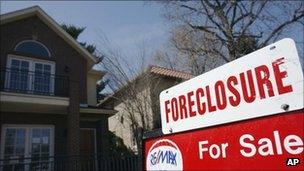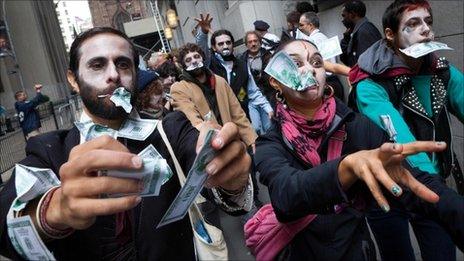Why the recovery feels worse than the recession
- Published
- comments

Unemployment and falling income has prompted further foreclosures
America feels a gloomier place today than when I arrived two years ago.
It is not hard to work out why. Most, including the president and the White House, expected people would be feeling the effects of the recovery by now.
The Washington Post's Ezra Klein has written a fascinating analysis, external of what went wrong.
"The promised recovery was always just around the corner, but it never quite came. Eventually, the American people stopped listening. A September poll showed that 50% of Americans thought Obama's policies had hurt the economy."
But a report, external from Sentier Research out today suggests the gloom isn't just down to punctured expectations.
People are actually poorer.
The report says that household income has gone down more in the period officially labelled as a recovery than in the recession itself.
The authors, Gordon Green and John Coder, who used to work for the US Census bureau, write that during the official recession, the real median annual household income fell from $55,309 (£35,287) to $53,518, a difference of 3.2%
But between June 2009 and June 2011 - a time when the US economy was in recovery - that same indicator of household income fell by an additional 6.7%, from $53,518 to $49,909.
Not surprisingly the figures indicate the unemployed suffered the largest drop in income (18.4% decline in median average income), but single-parent families (7.3%) and African-Americans (9.4%) also did badly.
The report found from the entire period of December 2007 to June 2011, real median annual household income has declined by 9.8%
"A decline of this magnitude represents a significant reduction in the American standard of living," the report authors say.
Being told the economy is officially in recovery when personally it feels nothing of the sort underlines the sense of disconnection between politicians and people.
This report is important because it suggests that this is not a question of mood, or the experience of some, but a hard fact of life for the average, or even median, American.
- Published8 October 2011
- Published3 October 2011
